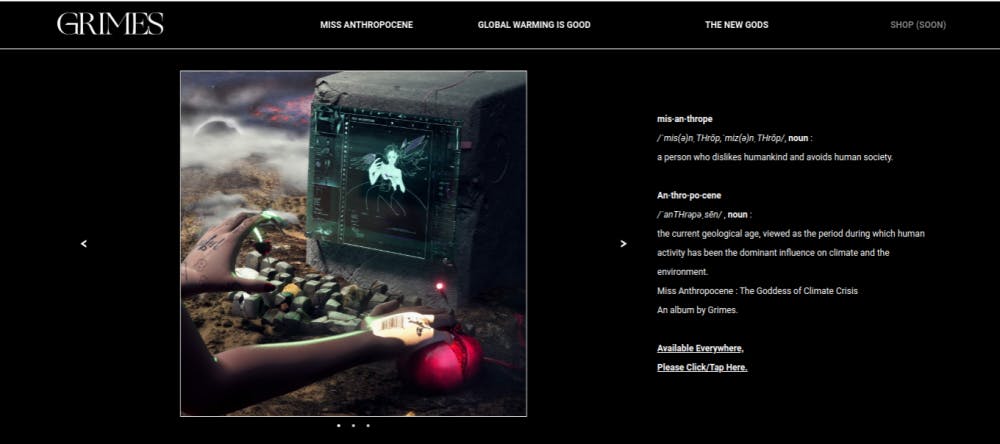The reality of Grimes is complicated and misunderstood. She’s a socialist but believes in free markets. Her pride in creating music is obvious, but she dreams of a world where the art form must compete with songs created by artificial intelligence.
The extinction of live music in favor of holograms and DJs is not a foreign concept to the techno-futurist, but an inevitability. Her fifth studio album, “Miss Anthropocene,” speaks to this future and marks the dynamic sounds of a post-human transformation from indie-pop start-up to villainous goddess hellbent on humanity’s self-made destruction.
“Miss Anthropocene” is a loose concept album detailing the death of humanity by various, otherworldly forces, or nymphs. Each track is meant to give life to death and present an opportunity to empathize with those forces that may bring about the end of all we know.
The title of the album is a play on misanthropy, a contempt for the human species, which Grimes has admitted to experiencing at times. The title also directly references the Anthropocene era, a proposed name for the current geologic epoch that catalogues humanity’s impact on the planet’s geology and ecosystems.
In an interview with The Wall Street Journal, Grimes said she wants to draw attention to environmental causes by making climate change “fun.”
The dichotomy between Grimes’ leftist attitudes and pseudo-enthusiasm for extinction have played a large role in shaping preconceptions over “Miss Anthropocene.” Her relationship to billionaire tech-mogul Elon Musk and recent pregnancy announcement have unfairly framed this album as Silicon Valley propaganda. Some observers of Grimes use her relationship as a foundation for class-centered criticism. Her artistic endeavors cannot simply be judged individually and must instead make mention of the Tesla co-founder. Despite these musings, “Miss Anthropocene” presents the artist with an opportunity for deconstruction and reinvention.
The album opens with “So Heavy I Fell Through the Earth,” a dreamy, downtempo, trip-hop track that speaks to a loss of agency. In developing this album, Grimes has mentioned that her pregnancy has been complicated by anxiety over a loss of self in subservience to becoming a mother. That feeling manifests into an ethereal, love ballad that sets the tone for the record. “Darkseid” is a violent, trap song that shares its name with a DC Comics supervillain. “Darkseid” is the interdimensional Demon God of Evil and is also one of DC’s New Gods, which is the name of another song on the album. The track features Aristophanes貍貓 (潘PAN), a Taiwanese rapper whose lyrics recount her experience with a friend who committed suicide.
On “Delete Forever,” Grimes lays bare her frustrations with being an artist. This track is a strong highlight of the record and was written on the night Lil Peep died. It captures the life of an artist in a culture that promotes vanity and vapid drug abuse. The production is bare but deliberate. A straightforward chord progression and supplemental banjos create a unique anchor for Grimes to flex her multi-instrumental talents.
“Violence” has perhaps the cleanest production on the record but is an otherwise simplistic track. Alternatively, “4AEM” represents Grimes’ attempt at reimagining the sounds of a Bollywood film for the 23rd century via intense drumbeats and moody synthesizers.
“New Gods” is a slow, melodramatic piano ballad that represents the definitive statement for the record by reimagining the frustrations of millennial pessimists. Our leaders have failed us, trash permeates the planet’s oceans and the air is thick with human-made pollutants. The New Gods created by Grimes are sick; their pride grows out of humanity’s hubris and self-destructive tendencies.
“My Name is Dark” stands out as an anthem for hyper-violent misanthropy. The public persona of Grimes will always be somewhat divisive or problematic. Grimes loves to discuss various philosophical ideas that come into conflict with her previous statements. As a champion of multiple, contradictory opinions, Grimes has grown numb to the outcry of critics and insecure fans. “My Name is Dark” solidifies the artist’s position as an otherworldly philosopher with a penchant for dangerous indifference.
The record finishes with “IDORU,” a track that contrasts the pessimism and apathy of previous tracks with a more hopeful message. The destruction is over, and the “New Gods” can rest. The planet is reborn. Grimes is reborn. Birds are chirping, and the air is clearing. This is the future that liberals want, one in which humans accept our relationship with transhumanism rather than remain subject to our fears of an uncertain future.
“Miss Anthropocene” speaks to the anxieties of a planet populated by pessimists, skeptics and cynics. In anthropomorphizing the end of humanity, Grimes has effectively given rise to a pantheon of repurposed ideas for a generation that has to combat climate change, air pollution, food scarcity and fake news. The tracks are somewhat disjointed for a concept album but parallel the chaotic harmony of its creator perfectly. Lest humanity desire extinction, we would be wise to listen to Grimes, the harbinger of our AI overlords.
Score: 8.5/10
Contact Gregory Florez at gflorez@alligator.org. Follow him on Twitter @gigi_gracie_.
"Miss Anthropocene," Grimes' fifth studio album, muses on the end of mankind.





